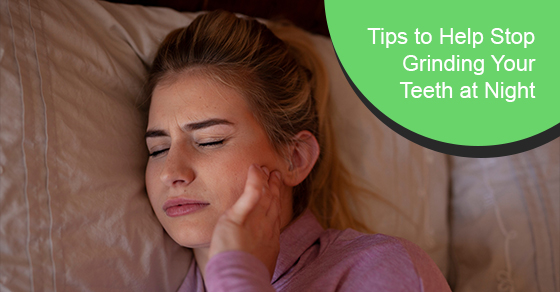Blog

Tips to Help Stop Grinding Your Teeth at Night
Posted by Dr. Julie Boudreault On 19-11-2020
Teeth grinding, or “bruxism,” is challenging for patients to acknowledge, as it often occurs during sleep. Grinding can also happen subconsciously if you tend to clench your jaw when you feel stressed.
While it might seem this shouldn’t cause concern, teeth grinding and jaw clenching can lead to issues including wear and tear of your teeth, bite issues, jaw problems and more. We look for signs of bruxism at your dental checkups, but there are also some symptoms that you can look out for yourself.
If you suspect you or your child grind their teeth, it’s best to give us a call so we can make a diagnosis and recommend treatment before damage is caused. Here we look at those symptoms and offer tips to help you stop grinding your teeth at night.
What causes bruxism?
People grind their teeth and clench their jaws for different reasons. Some of the most common causes of bruxism include:
- Stress and anxiety
- Some medications, including selective serotonin reuptake inhibitors (SSRI)
- Sleep disorders such as snoring, sleep apnea, sleep paralysis, etc.
- Lifestyle choices such as drinking, smoking, using recreational drugs, drinking caffeinated drinks
Symptoms of Bruxism
Some of the most common signs of teeth grinding include:
- Contractions of the jaw muscles
- Waking due to the grinding sound at night (or waking up your partner)
- Tight feeling in the jaw
- Ongoing face pain
- Headaches
- Swelling on the side of your lower jaw
- Ear pain
- Jaw pain
- Stiff neck and shoulders
How can I stop grinding?
Here are some tips to help you stop grinding your teeth at night:
1. Mouthguards and splints
Our office in Milton can prescribe a custom mouthguard. They work as an “occlusal splint” to provide cushioning for your teeth and help prevent you from grinding your teeth. Although you can purchase mouthguards at your local pharmacy, the custom mouthguard is designed to fit your teeth perfectly. This keeps them more secure and works better to protect your teeth and jaw from damage.
Custom mouthguards are also reasonably comfortable due to the fit, as well as the materials used. Many dental plans cover mouthguards, which saves you money.
2. Avoid chewy foods
Constant chewing can aggravate the symptoms of teeth grinding. Avoid chewy foods such as gum, candy, tough meats, popcorn, etc.
3. Avoid alcohol and caffeine
These things tend to cause your teeth grinding to get worse, so avoiding them can reduce how often you grind.
4. Stop biting or chewing anything but food
You might not realize other habits such as biting your nails, chewing on a pen or pencil, chewing ice, or even using your teeth to tear open packaging contribute to jaw and teeth issues. Only use your teeth to bite and chew food to help give your teeth and jaw a break and avoid damage.
5. Stress-reduction techniques
As mentioned, teeth grinding is often a result of stress and anxiety. You can practice stress reducing techniques to help reduce anxiety and stress, which can help alleviate your grinding and clenching. Some more common stress-relieving methods include:
- Meditation
- Yoga
- Talk therapy
- Exercise
- A warm bath before bed
You can also try to find out what is causing your stress or anxiety. When you understand why you are stressed out, you can try to avoid the issue. Sometimes even just knowing what is causing stress can help you cope with it more effectively.
6. Tongue and jaw muscle exercises
These exercises work to relax the jaw and facial muscles. When done regularly and correctly, they can also help you maintain proper jaw alignment. You can seek assistance from a physical therapist, as well as continue to practice your exercises at home, including:
- Opening your mouth wide while placing your tongue against your front teeth to relax the jaw.
- Saying the letter “N” out loud repeatedly to stop you from clenching.
- Gently massaging the sides of your jaw to help loosen and relax your jaw muscles.
Dental Side Effects of Teeth Grinding
Teeth grinding can cause damage to your teeth, including:
- Wear
- Flattening of teeth
- Loosening of teeth
- Tooth pain
- Cracks, damage, or fractures
- Breakage or damaging your fillings and crowns
- Interference with chewing and swallowing
If you have any of these side effects, there’s a good chance you grind your teeth without realizing it. The longer you continue to grind your teeth, the more damage you can cause, including painful temporomandibular joint (TMJ) disorders and the need for a long list of dental restorations such as bonding, fillings, bridges, or crowns.
The good news is your dentist is always looking for signs of bruxism at your regular dental checkups. They can help determine if you are grinding your teeth and recommend treatments to manage your bruxism.
To learn more about bruxism and how to stop grinding your teeth at night with the help of a custom mouthguard, call Milltown Dental at 905-878-8528 or contact us here.


Posted on 17-06-2022 by Devanshi Golecha
A variety of methods are given by the author to stop teeth grinding which are very useful for maintaining good oral health